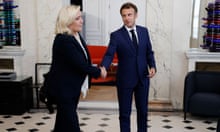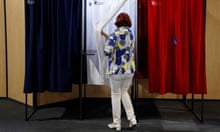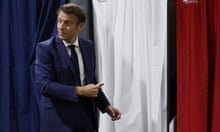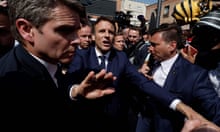Emmanuel Macron has indicated he could compromise on his heavily contested proposal to raise France’s retirement age by three years to 65, in an attempt to court voters ahead of the decisive second-round presidential election.
The president, who faces a tough campaign for a second term against the far-right leader Marine Le Pen, announced he would consider adjusting the timing and age of the controversial pension reform.
“I am ready to change the timeline and say we don’t necessarily have to do the reform by 2030 if I feel that people are too worried about it,” Macron said in northern France. He added that he was also prepared to consider raising the official retirement age to 64 rather than 65.
“I’ll open the door if this means a consensus,” he added.
Macron had pledged to implement the pension reforms during his first five years in office, leading to widespread protests and strikes. It has been a pillar of his reelection campaign. Retirement and pensions are incendiary subjects in France.
The current retirement age is 62 and Macron has argued that with people living longer, France’s pension system, which relies on those in work paying directly for those who have stopped, cannot be financially balanced without reform. His original proposal called for raising the retirement age by four months every year to reach 65 by 2032. Le Pen has said she will keep France’s retirement age at 60 for those who started work at a young age.
On Monday, Macron said other options could be considered and there would be special consideration for those in difficult and laborious jobs.
“I can’t say I want to unite people and listen, and then when I hear people say that’s it, I’m not budging,” he told BFMTV. “If I want to unite people, I have to listen.”
In the interview with BFMTV after his visit to Le Pen territory in France’s post-industrial northern rust belt on Monday, Macron, who is campaigning in eastern France on Tuesday, said he would be telephoning the other 10 candidates who lost in the first round vote.
“I am president of all the French and I want to talk to everyone. The country is divided,” Macron said.
The finance minister, Bruno Le Maire, insisted Macron was not backtracking on pension reform and was still determined to push it through. “There will be an option for discussing details,” Le Maire said.
On Tuesday, the former conservative president Nicolas Sarkozy announced he would be voting for Macron in the second round. On Monday, France’s largest union, the Confédération Française Démocratique du Travail (CFDT), and MEDEF, the business leaders’ organisation, both called for their members to support Macron.
The former Socialist prime minister Lionel Jospin and the former Socialist mayor of Paris, Bertrand Delanoë, both leftwingers, also backed Macron.
In the first round vote on Sunday, Macron scored 28% and Le Pen 23%, qualifying for a second round runoff, a repeat of 2017. The candidates will take part in a debate next week.
Macron and Le Pen face the challenge of convincing almost half the electorate who did not vote for either, particularly those on the left who turned out in force to support the radical left candidate Jean-Luc Mélenchon.
After Sunday’s first-round ballot, Mélenchon called for his supporters not to give “a single vote” to Le Pen, but stopped short of supporting Macron. Many leftwing voters orphaned by the second-round choice have said they will stay at home for the second round on 24 April.
On FranceInter radio on Tuesday morning, Le Pen, whose programme is anti-immigration, anti-European Union and economically protectionist, said Mélenchon had “betrayed” his voters with his election night declaration. And she accused Macron of being “obsessed” over pensions.
“It’s all he talks about,” she said.
Le Pen is concentrating on what opinion polls suggest is French voters’ main concern, the rising cost of living, and particularly soaring fuel and food prices. She has also said she wants to be “president of all the French” and has promised a government of “national unity”, including ministers from the left and right if elected.
Le Pen denied her plan to form an “alliance of European nations” was “Frexit” by stealth, but added: “I think a large majority (of French) don’t want the European Union as it exists now. It is anti-democratic and it operates by threats and blackmail against the interest of the (French) people and our economy. We are for European countries cooperating with other countries in Europe.”
She said to suggest this was Frexit disguised was “absolute rubbish”. “I have no hidden project,” she said.

Le Pen also denied being a “Trojan horse for Russia”, insisting she supported general economic sanctions against Moscow for Russia’s war in Ukraine, although still opposing sanctions on Russian gas because these would hit French people. The Front National, as her party was called at the time, secured a €9m loan from a Russian bank to fund her 2017 presidential bid, which it is still repaying. The party, now the Rassemblement National, was the only party in France to back Russia’s annexation of Crimea. Her election pamphlet featured a photograph of Le Pen with Vladimir Putin in Moscow, although she has since condemned the Russian invasion of Ukraine.
On Tuesday, she also defended one of her most controversial election pledges; to ban the Islamic headscarf in public places.
“The headscarf is an Islamist uniform not a Muslim uniform. It is the uniform of an ideology not a religion,” she told FranceInter. Asked if this would mean banning other religious symbols such as the kippur or cross, she replied: “This ban would not be founded on principles of secularism but based on the law of fighting Islamic extremism, which is a totalitarian ideology.”
She also brushed aside suggestions far right presidential candidate Éric Zemmour might join her team. “He doesn’t want to and I don’t want it either,” she said. “I have all the teams I need. I could form four or five. I know who will be my prime minister but I’m not saying.”










